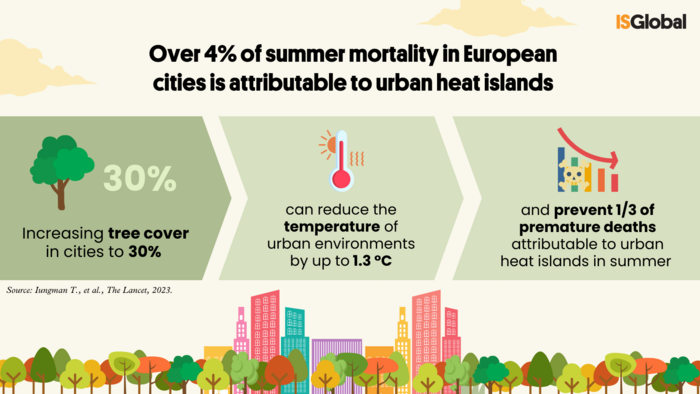Over four percent of deaths in cities during the summer months are due to urban heat islands, and one third of these deaths could be prevented by reaching a tree cover of 30%, according to a modelling study published in The Lancet and led by the Barcelona Institute for Global Health (ISGlobal), an institution supported by “la Caixa” Foundation. The study results, obtained with data from 93 European cities, highlight the substantial benefits of planting more trees in cities to attenuate the impact of climate change.

Credit: ISGlobal
Over four percent of deaths in cities during the summer months are due to urban heat islands, and one third of these deaths could be prevented by reaching a tree cover of 30%, according to a modelling study published in The Lancet and led by the Barcelona Institute for Global Health (ISGlobal), an institution supported by “la Caixa” Foundation. The study results, obtained with data from 93 European cities, highlight the substantial benefits of planting more trees in cities to attenuate the impact of climate change.
Exposure to heat has been associated with premature mortality, cardiorespiratory disease and hospital admissions. This is particularly true for heat waves, but also occurs with moderately high temperatures in summer. Cities are especially vulnerable to higher temperatures. Less vegetation, higher population density, and impermeable surfaces for buildings and roads, including asphalt, lead to a temperature difference between the city and surrounding areas – a phenomenon called urban heat island. Given the ongoing global warming and urban growth, this effect is expected to worsen over the next decades.
“Predictions based on current emissions reveal that heat-related illness and death will become a bigger burden to our health services over the next decades,” says ISGlobal researcher Tamara Iungman, first author of the study.
An international team led by Mark Nieuwenhuijsen, director of the Urban Planning, Environment and Health Initiative at ISGlobal, estimated mortality rates of residents aged over 20 in 93 European cities (a total of 57 million inhabitants), between June and August 2015, and collected data on daily rural and urban temperatures for each city. The analyses were performed at a high-resolution level (areas of 250m x 250m). First, they estimated the premature mortality by simulating a hypothetical scenario without urban heat island. Second, they estimated the temperature reduction that would be obtained by increasing tree cover to 30% and the associated mortality that could be avoided.
“Our goal is to inform local decision-makers about the benefits of integrating green areas into all neighborhoods in order to promote more sustainable, resilient and healthy urban environments,” explains Nieuwenhuijsen.
The protective effect of trees
The results show that, from June to August 2015, cities were on average 1.5oC warmer than the surrounding countryside. In total, 6,700 premature deaths could be attributed to hotter urban temperatures, which represents 4.3% of total mortality during the summer months and 1.8% of year-round mortality. One third of these deaths (2,644) could have been prevented by increasing tree cover up to 30%, thereby reducing temperatures. Overall, cities with the highest excess heat-mortality rates were in Southern and Eastern Europe, with these cities benefiting the most from an increase in tree cover.
The study highlights the substantial benefits of planting more trees in cities, although the authors acknowledge that this can be challenging in some cities due to their design, and that tree planting should be combined with other interventions such as green roofs or other temperature-reducing alternatives.
“Our results also show the need to preserve and maintain the trees that we already have because they are a valuable resource and it takes a long time to grow new trees. It is not only about increasing trees in the city, it is also about how they are distributed,” says Nieuwenhuijsen.
The analyses were done for 2015 because population data were not available for later years, but, as Iungman points out, the study provides valuable information for adapting our cities and making them more resilient to the health impact of climate change. “Here we only looked at the cooling effect of trees, but making cities greener has many other health benefits, including longer life expectancy, fewer mental health problems and better cognitive functioning”, she adds.
“Vulnerability to heat changes from city to city depending on several factors. Understanding the benefits of policies such as increasing tree cover can help inform action to reduce risks and prevent avoidable deaths, especially with climate change”, says Antonio Gasparrini, Professor of Biostatistics and Epidemiology at the London School of Hygiene & Tropical Medicine (LSHTM) and one of the authors of the study.
Supplementary material
Dataset: Check the resulting data for the 93 European cities.
Videos: Quotes Mark Nieuwenhuijsen; Quotes Tamara Iungman
Reference
Iungman T, Cirach M, Marando F., Pereira-Barboza E., Khomenko S., Masselot P., Quijal-Zamorano M., Mueller N., Gasparrini A., Urquiza J., Heri M., Thondoo M., Nieuwenhuijsen M. Cooling cities for health through urban green infrastructure: a health impact assessment for European cities. The Lancet, 2023. https://doi.org/10.1016/S0140-6736(22)02585-5
Journal
The Lancet
DOI
10.1016/S0140-6736(22)02585-5
Method of Research
Computational simulation/modeling
Subject of Research
People
Article Title
Cooling cities for health through urban green infrastructure: a health impact assessment for European cities
Article Publication Date
31-Jan-2023
COI Statement
The authors declare no competing interests



